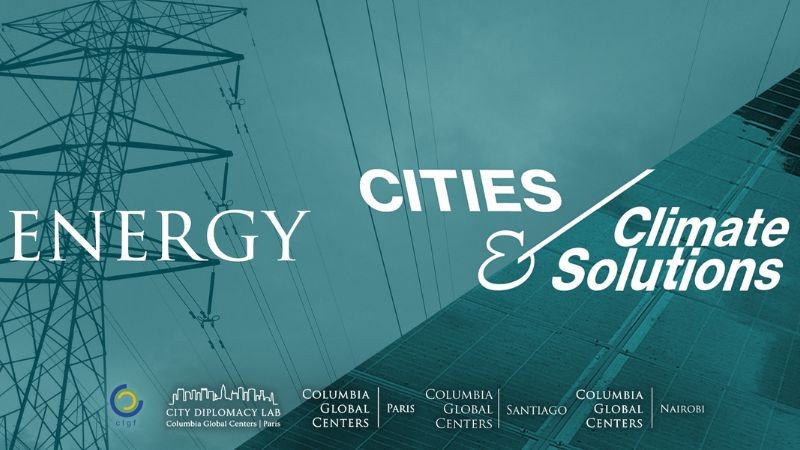Navigating Urban Energy Challenges in Santiago, Braga, and Nairobi
The fourth event in the Cities & Climate Solutions series fetatured Mauricio Fabry from the Metropolitan Regional Government of Santiago.

In response to the global climate crisis, cities worldwide are emerging as pivotal players in developing effective, multi-layered responses. Launched in Spring 2023, the Cities & Climate Solutions series, co-organized by the Paris Global Center and the City Diplomacy Lab, strives to unite representatives from cities that have implemented impactful and sustainable actions. The series aims to inspire the numerous cities and local governments committed to shaping the global response to climate change.
After covering topics like food and water in the first half of 2023, the second season of the series kicked off in November, focusing on air, energy, and waste. Each event brings together representatives from three cities across different regions and countries, moderated by a Columbia representative.
Against the backdrop of the COP28 summit in Dubai, the fourth event, held on December 5, focused on urban energy challenges. Co-sponsored by the Nairobi and Santiago Global Centers and the Commonwealth Local Government Forum (CLGF), the event featured representatives from Santiago (Chile), Braga (Portugal), and Nairobi (Kenya). The discussion was moderated by City Diplomacy Lab Director Lorenzo Kihlgren Grandi.
The panel included Hélder Costa, advisor to the president of the Municipality of Braga, supporting the city’s sustainable development strategy; Hirbahim Otieno, County Chief Officer in charge of Environment, Climate Change, and Natural Resources in the Nairobi City County; and Mauricio Fabry, Head of the Department of Environment, Biodiversity, and Climate Action in the Metropolitan Regional Government of Santiago.
After opening remarks by Séverine Martin, Public Programs Manager at the Paris Center, and Claire Frost from CLGF, the panelists addressed how the climate crisis is impacting how people live at the local government level in each of their respective cities, discussed solutions for a just transition and energy provision to address energy poverty.
Insights from Santiago
Regarding the Santiago Metropolitan Area, Fabry highlighted Santiago's significant advances in decarbonizing its energy matrix, increasing renewable energy usage from 39% to over 60% in the last decade (projected to reach 70% by the end of 2023). The use of fossil fuels is at 28%, with the use of oil at only 6%. Notably, 25% of the energy is produced from solar panels, contributing to Santiago to be the city outside of China with the second largest electric bus fleet. In fact, by 2030, all public transportation in the Chilean capital will be powered by electromobility.
Since the use of renewables has proven to be a profitable business, Fabry mentioned that many land owners from the outskirts of the urban area of Santiago are moving away from farming and agriculture turning their lands into solar power panels centers. According to Fabry, this creates a problem because Chile produces 30% of the vegetables consumed in the country, so these energy power stations are competing with farming and agriculture and that means that whatever the country does not produce will have to import. Collaborative solutions are being explored in order mitigate this conflict, such as integrating solar panels with agriculture and farming.
Addressing current challenges, Fabry emphasized the importance of proximity and human-scale urban planning. He highlighted the concept of the “15-minute city” developed by professor Carlos Moreno: “Many people in Santiago lose hours in transportation every day, which is not only problematic for them, but also implies a great deal of energy,” he said, adding that quality services territories would enhance the quality of life and save substantial energy. All of this requires urban planning, which remains a challenge because “we usually don’t think about how we plan our cities. In Santiago we are facing as we speak, the reality of how to adapt to current extreme temperatures and droughts,” he stated.
Watch the complete session on Energy here. Revisit the Spring conversation on Food here.